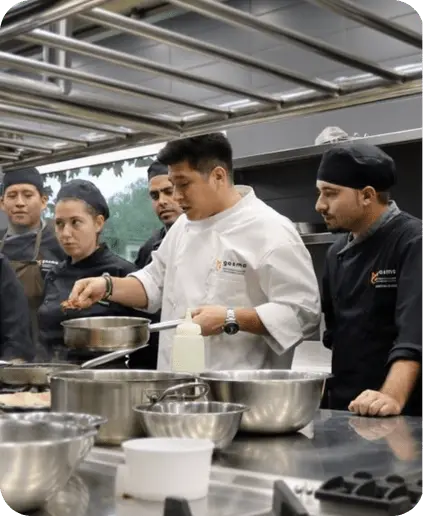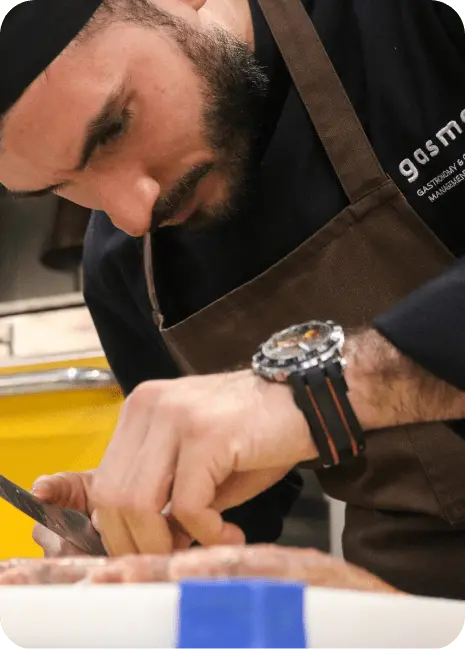
This module will explore how diverse cultural influences have affected the European culinary landscape, and how chefs have adapted their culture and experience in different countries to suit the local palate, using ingredients and culinary techniques specific to each region.
Module sessions:
Japanese cuisine
Peruvian cuisine
Indian cuisine
Mexican cuisine
Italian cuisine
French cuisine
In this module, students will explore various gastronomic business models in Spain and discover products with designation of origin that make experiences unique. We will analyze different themes in culinary proposals, explore the environment, the organization and the inspirations behind the most recognized gastronomic offerings around the world.
Module sessions:
Seafood cuisine
Rural cuisine
Mediterranean haute cuisine
The world of sommeliers
This module begins by identifying the most common utensils used in charcoal cooking. We then compare the different types of wood and smoking techniques to understand the behavior of fire. We explore different cooking methods and examine the application of embers in seafood cooking and maturation of meat on grills. We also explore how restaurant pastry can use fire techniques.
Module sessions:
Professional grilling machinery
Smoke and types of wood
High quality meats and fish
Cooking pastry with embers

Your passion and your talent deserve the best system to develop, and that is precisely what we offer you: a learning model that transcends conventional classrooms.
In our Diploma in Gastronomic Trends, we embrace the "learning by doing" methodology with which theory comes to life through your hands and senses, turning each lesson into a unique opportunity to explore, experiment and create.
Imagine an environment where ingredients, pots and pans become tools of expression. In each class, you'll be immersed in the action; from mastering precise cuts to creating signature dishes that stir emotions. Every seasoning, every texture and every presentation will be the palpable result of your effort and dedication.
You will learn as you create, honing your skills in real time. What better way to internalize culinary techniques than by putting them into direct practice?
The "learning by doing" methodology not only accelerates your learning, but also cultivates self-confidence. It's not just about listening and remembering, it's about experimenting and creating.
If you are looking for an eminently practical training that will help you unlock your full gastronomic potential, you are in the right place: join us and start creating your own culinary stories from day one!

Next call: October 2026
Classes: Information will be available soon
Format: On-site
Located: Castellón, Spain (see location)
Language: Spanish. Simultaneous translation into English.
Credits: 16 ECTS (Credit system)
Extras included in the registration:
If you already know that you want to study with us, enrolling in our training is very easy.
You must fill in the admission form that you can find in the button 'START ENROLLMENT'.
You will then receive an email confirming receipt of your application and we will contact you via email / call / whatsapp to move on to the next phase of the process: the interview with the Admissions Committee.
Within 24 hours of receiving your application, you will be scheduled for a personal interview* with a member of the Gasma faculty or admissions team.
The purpose of the interview is to get to know the candidates, and to assess their knowledge of the industry and their aptitude for the program.
In this interview, we will let you know if you need to provide any additional documents to complete your application.
* If you are unable to attend in person, the interview can also be conducted via Skype.
After the personal interview, the Admissions Committee will evaluate your application.
Once your application has been evaluated, we will inform you of the result.
If you have been accepted... Congratulations! The admission process has been completed.
In order to secure your place, it is necessary to formalize the payment of the reservation.
Once the place reservation is paid, we will review with you again the necessary documentation for your enrollment. Remember that you must have sent us the following information: ID/Passport, Resume or Letter of motivation and required academic documentation (if necessary).
Gasma is located in Castellón de la Plana (Valencian Community), Spain. The nearest airport is Valencia International Airport (70 km away). Our city is 2 hours by train from Barcelona and just under 3 hours from the capital of Spain, Madrid.
Gasma - Gastronomic Campus
Avenida Enrique Gimeno, 67
12006 Castellón, Spain, EU
Tel: +34 964 217 649
Our international student body continues to grow. We have students of more than 75 nationalities. European students do not need a visa to study in Spain. On the other hand, non-European students must obtain the corresponding visa that includes the authorization to stay in the country.
Students from certain countries are exempt from obtaining a visa as long as their stay in Spain does not exceed three months.
The visa will be requested and issued at the Spanish Consular Offices abroad. Once in Spain, Gasma offers non-EU students the optional International Fee service: with it, they can apply for the foreign student card through the Immigration Office or the corresponding police station within one month of their arrival.
To make your stay easier and more comfortable during your studies, Gasma has agreements with various organizations to provide our students with accommodation options nearby. In advance of your arrival you will be able to choose and reserve your accommodation in an apartment, student residence, etc. Contact our admissions department to clarify any doubts regarding this issue.
No. The Diploma in Gastronomic Trends does not include external internships since it is an intensive course with continuous evaluation. The methodology of our programs is practical and participatory. This approach is what makes us unique: we move away from purely demonstrative classes and invite students to step forward and participate in them: cooking alongside the best, learning successful models from the experience of the best professionals. You don't just observe, you learn by doing.
